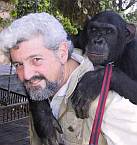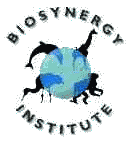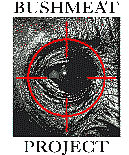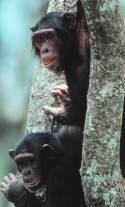 Great apes -- gorillas, chimpanzees, and bonobos -- are being hunted to extinction for commercial bushmeat in the equatorial forests of west and central Africa. A ragged far flung army of a few thousand commercial bushmeat hunters supported by the timber industry infrastructure will illegally shoot and butcher more than two billion dollars worth of wildlife this year, including as many as 8,000 endangered great apes. People pay a premium to eat more great apes each year than are now kept in all the zoos and laboratories of the world. If the slaughter continues at its current pace, the remaining wild apes in Africa will be gone within the next fifteen to fifty years. With them will vanish most of the equatorial rain forest, and the cultures of indigenous people who have lived there for millennia.
Great apes -- gorillas, chimpanzees, and bonobos -- are being hunted to extinction for commercial bushmeat in the equatorial forests of west and central Africa. A ragged far flung army of a few thousand commercial bushmeat hunters supported by the timber industry infrastructure will illegally shoot and butcher more than two billion dollars worth of wildlife this year, including as many as 8,000 endangered great apes. People pay a premium to eat more great apes each year than are now kept in all the zoos and laboratories of the world. If the slaughter continues at its current pace, the remaining wild apes in Africa will be gone within the next fifteen to fifty years. With them will vanish most of the equatorial rain forest, and the cultures of indigenous people who have lived there for millennia.
It is time that those of us who care about the survival and well-being of the apes, and all life in Africa, confront this crisis. Since our first reports to the international conservation community in 1996 the Bushmeat Project has been urging conservation donors to support programs aimed at helping the African people protect the apes and other endangered animals. The largest wildlife and animal welfare organizations in North America joined us in 1999 in agreement that the Bushmeat Crisis is a top priority concern. It is time to act.
 If we are to stop the slaughter of protected and endangered species we must do so with and through the people who are now involved in the trade, from lorry driver to logging executive, hunter to housewife, gendarme to gentry. Conservation must pursue the biosynergy of humanity and nature in order to find alternative ways to satisfy the human needs that drive the destructive commercial trade in wildlife bushmeat.
If we are to stop the slaughter of protected and endangered species we must do so with and through the people who are now involved in the trade, from lorry driver to logging executive, hunter to housewife, gendarme to gentry. Conservation must pursue the biosynergy of humanity and nature in order to find alternative ways to satisfy the human needs that drive the destructive commercial trade in wildlife bushmeat.
The Bushmeat Project has been established to support partnerships that will help the people of equatorial Africa to protect the region’s vital ecosystems and vibrant societies. The program is a long-term effort to provide economic and social incentive and to enable the expansion of capacity in the conservation arena. For more organizational and program details about the Bushmeat Project please read our Action Agenda, as well as the Project's Mission, Goals and Driving Principles. If you want to join this effort please contact us at .
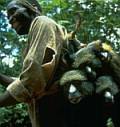 A primary theme of the Bushmeat Project has been the attempt to convert “poachers to protectors.” It began in 1996 when Anthony Rose was introduced to an ex-gorilla hunter in Cameroon’s Eastern Province. See the article "Finding Paradise in a Hunting Camp" to learn how Dr. Rose's involvement in this effort began. The Bushmeat Project has been helping to support the ex-hunter Joseph Melloh in his efforts to become a conservationist. The program led to the establishment of a protected area where Joseph and a small team of conservationists helped two village communities to manage a forest, with the intention of developing gorilla research and tourism as an alternative to hunting and logging. A report on Joseph’s progress in this project and in his other conservation efforts will be posted here soon.
A primary theme of the Bushmeat Project has been the attempt to convert “poachers to protectors.” It began in 1996 when Anthony Rose was introduced to an ex-gorilla hunter in Cameroon’s Eastern Province. See the article "Finding Paradise in a Hunting Camp" to learn how Dr. Rose's involvement in this effort began. The Bushmeat Project has been helping to support the ex-hunter Joseph Melloh in his efforts to become a conservationist. The program led to the establishment of a protected area where Joseph and a small team of conservationists helped two village communities to manage a forest, with the intention of developing gorilla research and tourism as an alternative to hunting and logging. A report on Joseph’s progress in this project and in his other conservation efforts will be posted here soon.
The biggest challenge now facing conservationists is to reduce the demand for bushmeat. Our Conservation
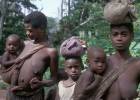 Values Education Program is beginning its fourth year, with expectations for continued success evoking empathy for apes and other primates that will keep people from buying and eating them. Ten thousand copies of Koko's Kitten in French and English were sent to Africa in 2000 and have been used in teaching curricula and community meetings with over three thousand people in schools, training workshops, and rural villages in Cameroon and across the region. Villagers hunters and elders have begun to integrate their own legends about apes and monkeys into the values education curricula, and are taking on the conservation education mission. Results of CVE research in eight villages are being integrated into a major report on this effort.
Values Education Program is beginning its fourth year, with expectations for continued success evoking empathy for apes and other primates that will keep people from buying and eating them. Ten thousand copies of Koko's Kitten in French and English were sent to Africa in 2000 and have been used in teaching curricula and community meetings with over three thousand people in schools, training workshops, and rural villages in Cameroon and across the region. Villagers hunters and elders have begun to integrate their own legends about apes and monkeys into the values education curricula, and are taking on the conservation education mission. Results of CVE research in eight villages are being integrated into a major report on this effort.
The Bushmeat Project and the Biosynergy Institute are working now to build partnerships with other wildlife conservation organizations. The institutionalization and
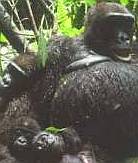 expansion of the Bushmeat Project discoveries and innovations requires an infusion of new organizational structure, as well as enhanced capacity and fund raising processes. Individuals and corporate leaders who have such resources to contribute are invited to contact us at to discuss your potential for involvement.
expansion of the Bushmeat Project discoveries and innovations requires an infusion of new organizational structure, as well as enhanced capacity and fund raising processes. Individuals and corporate leaders who have such resources to contribute are invited to contact us at to discuss your potential for involvement.
For organizational and program details about the Bushmeat Project please read our Action Agenda and the Project's Mission, Goals and Driving Principles.

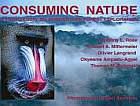
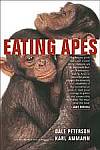 Now available:
Now available: 
